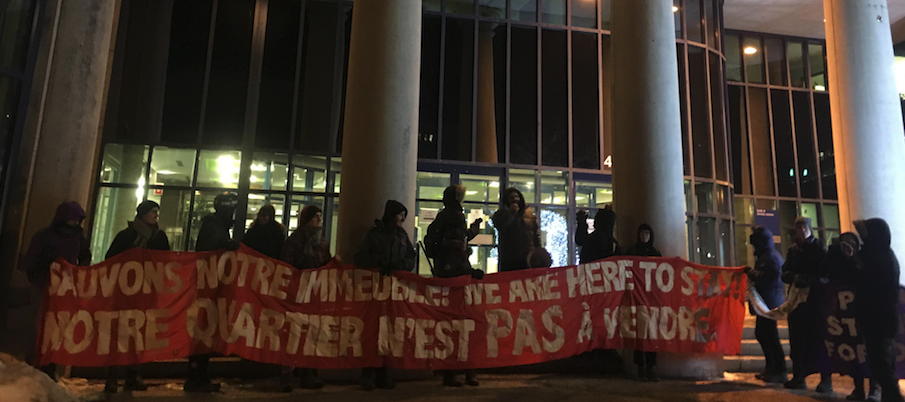The McGill Daily published an exposé on Feb. 19 of a landlord’s eviction of the residents of a Parc-Extension building in the name of a luxury apartment project. This comes at a time when Montrealers across the city are protesting gentrification in their neighbourhoods. Gentrification, a complicated process that involves redevelopment of a neighbourhood to appeal to middle-class consumers, results in the displacement of existing inhabitants. As long-term residents are illegally pushed out in favour of high-end apartment complexes, community networks and resources are threatened.
To some, the issue of gentrification may seem disconnected from student concerns. Yet, it is necessary for students to recognize that their presence is appealing to developers, and then strategically work to support existing communities. This is especially relevant in Montreal, where neighbourhoods like Parc-Ex, Saint-Henri, the Mile End, and the Milton Parc community have all faced rent hikes, the ousting of local businesses, and an influx of transient students. In the case of Parc-Ex, development projects are progressing alongside UdeM’s plans to open a new branch in the neighbourhood. This neatly demonstrates the connection between students and gentrification; gentrifying developers wish to capitalize on a growing student presence while undermining the well-being of neighbourhood residents. As students move toward working life, they must remember that they exist within the matrix of a broader community, and their actions within their neighbourhood have consequences.
While students may be more focused on passing their midterms than preserving the integrity of the areas that they live in, they should still be aware of the impact they have on their surroundings. Students are a unique demographic: Many hold the social status of the pre-professional—who often has the support of parents, universities, and networks of peers and mentors—alongside an independent rootlessness that leaves little room for them to contribute to community building. Furthermore, student communities are often localized on campus, rather than in their neighbourhood. This is especially true at McGill, where four-fifths of students do not list French as their mother tongue and might, because of this, feel unable to fully participate in Montreal’s bilingual culture.
Since most students occupy their Montreal dwellings for such a short time, there is also a disconnect between tenant and landlord. An influx of students may perforate a tightly knit neighbourhood community and mark it as a desirable neighbourhood for development. Additionally, students graduating from McGill are more likely to reach a higher pay grade than those without a college education, and might unwittingly transform into the young urban professionals that gentrifying developers cater to. This could oust past residents who are no longer capable of paying spiking rent costs, putting their welfare at risk.
In light of their relationship to gentrification, students have a mandate to be conscientious, both in their relationship with the spaces they live in during university, and with the neighbourhoods they choose to occupy afterward. This entails lobbying for stricter laws against rent hikes, as well as for governmental support for public spaces. It also means being aware of community organizations and, in the case of mobilization against gentrification, supporting permanent residents in their efforts. Examples of mobilization include the Parc-Ex residents’ Feb. 20 demonstration outside Parc Metro station and the 2012 takeover of Building 7 in South-West Montreal by members of the community. There are many ways that students can take on supportive roles: Ranging from raising awareness on social media to joining local groups protesting gentrification.
In the long term, students must also be aware and critical of their own mindset. From coming out of university, to beginning their first job, to settling down, students at every stage of life must ask themselves: Why am I moving where I am? What is my role in this community? A community-based mindset is necessary for the health of the neighbourhood. An individual does not exist as a free agent, but within the context of others.
Just because students are transient occupants of an area does not mean that they do not have a responsibility to that neighbourhood. It is possible to be impermanent and empathetic at the same time. By thinking about community alongside individuality, students can do their part in supporting the residents of Montreal, and any city they might live in after they leave McGill.
A previous version of this article incorrectly stated that UQAM plans to open a new branch in the Parc-Ex neighbourhood. In fact, UdeM is proceeding with a new campus in Parc-Ex. The Tribune regrets this error.








